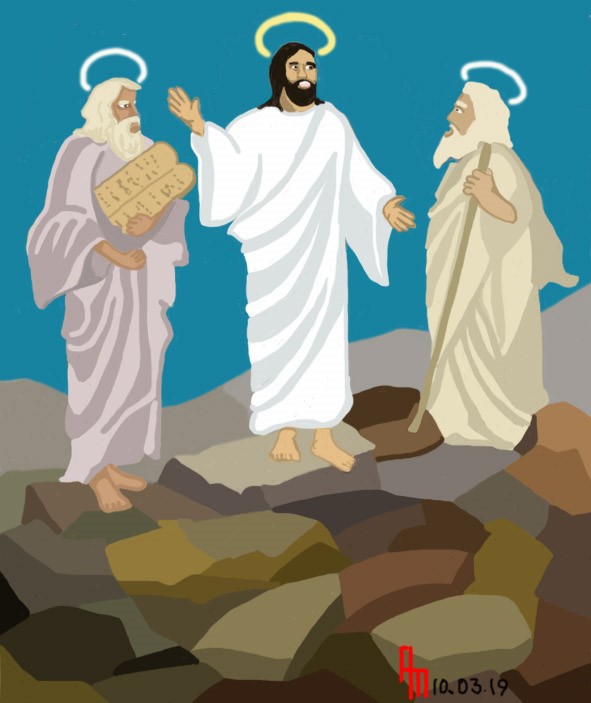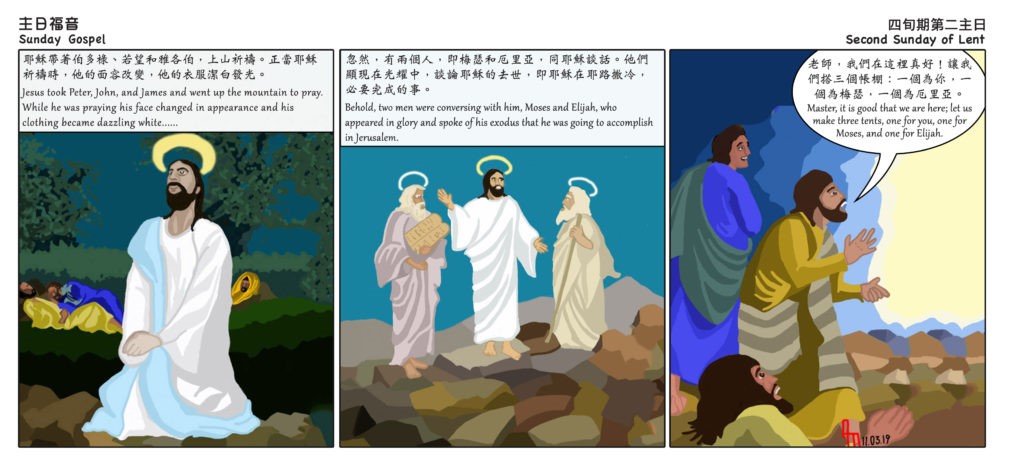Gn 15:5-12, 17-18; Phil 3:17-4:1; Lk 9:28-36
– Edmond Lo
Born a resident of Tsuen Wan, Hong Kong, I grew up admiring the Tai Mo Shan, which held our small rural town in its broad embrace like a giant. What is it like to stand atop the mountain and take in the panoramic view of the low-lying town, its farmlands, its harbor, the nearby islands and the ocean beyond? Wouldn’t it be nice to be able to let go of the burdens of school work and roam wild in the woods of the mountain? What’s hidden underneath the clouds that cover its summit all year round? Does God live there?
Those were my daydreams, a rural town boy sitting in the classroom of Tsuen Wan Government Primary School, looking out its windows to the awe-inspiring Tai Mo Shan….
The mountain is a special place in the Bible. No serious reader can afford to overlook the significance of mountain symbolism in the Bible: it’s a place of ascent; it’s a liberation from the burden of life; its majestic height enables us to see wider and farther; it connects us to the Sacred and Divine and puts us in touch with the Creator.
It is, therefore, no coincidence that so many important moments of Jesus’ life took place in the setting of the mountain: the temptation, the Sermon on the Mount, the Transfiguration in today’s gospel reading, his agony on Mount Olive, the Crucifixion, and his Ascension.
Looking further into the Old Testament, there were the Old Testament mountains of revelation: Mount Moriah, where Abraham sacrificed Isaac and later King Solomon built the Jerusalem Temple; Mount Sinai where the Decalogue was proclaimed to, and a covenant made with, Israel; Mount Horeb, where God revealed Himself to the prophet Elijah following “strong and heavy wind,” “an earthquake,” “fire,” and “a tiny whispering sound” (1 Kings 19:11-12).
The mountains of the Bible were remote and yet they formed the backdrops for the close encounters between God and men; unreachable and yet they comprised the settings in which God’s words and ordinances were made within human reach; hidden and hard to find and yet it’s in their lofty heights and sacred spaces that God revealed Himself to those who sought Him.
The Mysterious Reasons of the Heart
– Fr Fernando Armellini SCJ
Claretian Publications, Macau
Jesus goes up the mountain to pray. Jesus usually spends much time in prayer. It is in one of these intense spiritual moments that Jesus becomes aware that he is called to save people not through triumph but through defeat. During prayer, the aspect of his face changes.
This splendor is the sign of the glory that wraps one who is united to God. Even the face of Moses became brilliant when he entered into dialog with the Lord (Ex 34:29-35).
Every authentic encounter with God leaves some visible traces on the face of the person. After the celebration of the Word, we return to our houses more joyful, more serene, better, smiling and willing to be tolerant, understanding, and generous. Even our faces are relaxed and seem to emit light.
The light on Jesus’ face indicates that, during prayer, he understood and owned the Father’s plan. During this spiritual experience, Moses and Elijah appear. They are symbols of the Law and the Prophets, the whole Old Testament. They enter into a dialog with Jesus; the Old Testament is oriented towards him.
The three disciples: Peter, James, and John understand nothing of what was happening. They were sleepy. Remember that in moments of recalling the passion and death of Jesus, these three disciples are always taken by sleep. In the garden of Olives, they sleep (Mk 14:32-42; Lk 22:45). It’s strange that in crucial moments their eyes are always heavy.
Sleep indicates the inability of the disciples to understand and to accept that the Messiah of God must pass through death in order to enter into his glory. When Jesus performed prodigies, when the crowd acclaimed him, the apostles were awake. But when he starts talking about suffering, the necessity to occupy the last place, to become servants, they do not like to understand, they start to sleep … to continue to dream of applauses and triumphs. The three tents are indicative of their desire to stay in successes and not accept the defeats that they are to undergo.
The voice from heaven says to listen to Jesus—even when he seems to propose very difficult paths, narrow roads. It is not easy to believe in the revelation of Jesus and to accept his proposal of life. It is not easy to follow him in his “exodus.”
The seed thrown on the ground is destined to produce many fruits, but today, it must die. The glory comes only later. When and how will this “wisdom of God” so contrary to the logic of man be assimilated?



 Follow
Follow


